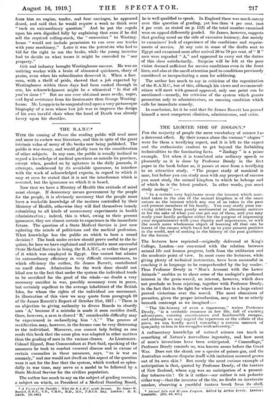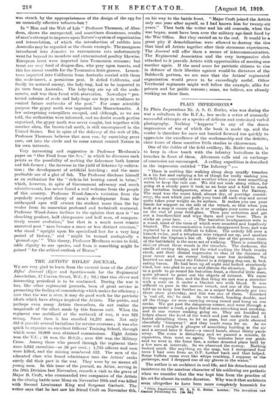THE LIGHTER SIDE OF ZOOLOGY.*
Fon the majority of people the mere vocabulary of science I as a deterrent effect. By their names alone the various " elegies " wear for them a terrifying aspect, and it is left to the expert and the enthusiastic student to get beyond the forbidding technicalities to the fascinating facts. " Zoology " is a prime example. Yet when it is translated into ordinary speech so pleasantly as it is clone by Professor Dendy in the first paper in the book before us, it passes at once from a terrifying to an attractive study. " The proper study of mankind is man, but before you can study man with any prospect of success you must study the animal kingdom to which he belongs and of which he is the latest product. In other words, you must study zoology " :- " In a certain very legitimate sense the interest which man- kind takes in the rest of the animal kingdom is of the same nature as the interest which any one of us takes in the past and present members of his family. You may study your sur- viving relatives from purely sentimental or altruistic motives or for the sake of what you can get out of them, and you may study your family pedigree either for the purpose of impressing your acquaintances with your dignity and importance, or with the much more wholesome object of learning all that can be learnt of the causes which have led up to your present position in the world, and of seeking in the history of the past guidance for the future."
The lectures here reprinted—originally delivered at King's College, London—are concerned with the relation between animal life and human progress, both from the utilitarian and the academic point of view. In most cases the lecturers, while giving plenty of technical instruction, have been successful in couching it in language to be comprehended by the lay reader. Thus Professor Dendy in " Man's Account with the Lower Animals " enables us to share some of the zoologist's profound interest in the grain-weevil, an interest, however, which does not preclude us from rejoicing, together with Professor Deady, in the fact that in the fight for wheat man has to a large extent proved victorious over the weevil. The most obnoxious of parasites, given the proper introduction, may not be so utterly beneath contempt as we imagined :— " The life-history of even a tapeworm," writes Professor Dendy, "is a veritable romance in low life, full of exciting adventures, cunning contrivances and hairbreadth escapes, and although we may regard the tapeworm as the villain of the piece, we can hardly avcil extendin; a certain amount of sympathy to him in his struggles with adversity."
A rudimentary knowledge of natural science can teach us something of Nature's marvellous ingenuity, and how most of man's inventions have been anticipated. " Camouflage," Professor Dendy reminds us, was known aeons before the Great War. Does not the skunk use a species of poison-gas, and the Australian seahorse disguise itself with imitation seaweed grown out of its own skin ? But surely the most curious example of anticipation is that, quoted by Professor Dendy, of the tuatara of New Zealand, whose egg was an anticipation of a present- day tobacco-tin ! Or is it rather—our author is not pedantic either way—that the inventor of the tin, no doubt an inveterate smoker, observing a youthful tuatara break from its shell,
* Animal Life and II: man I'restreee. Edited by Arthur Dcr.dy. London: Constable. pos. ed. net.]
was struck by the appropriateness of the design of the egg for an unusually effective tobacco-box ?
In " Man and the Web of Life " Professor Thomson, of Aber- deen, shows the unexpected, and sometimes disastrous, results of man's attempt to improve upon Nature's system of organization and interrelation, of which the introduction of rabbits into Australia may be regarded as the classic example. The mongoose introduced into Jamaica to exterminate rats unfortunately went far beyond its mandate and exterminated poultry likewise. European trout were imported into Tasmanian streams: but trout are very fond of dragon-flies, who prey upon insects, and this has meant trouble for the Tasmanian fruit-grower. Lemon- trees imported into California from Australia carried with them the scale-insect, a pernicious pest. It defied California, and finally its natural enemy, the lady-bug, had to be imported in its turn from Australia. The lady-bug ate up all the scale- insects, and was then faced with starvation. Nowadays " pro- tected colonies of scale and lady-bugs are kept in readiness to control future outbreaks of the pest." For some scientific purpose the gypsy moth was imported into Massachusetts. A few enterprising caterpillars escaped, and although, as we are told, the authorities were informed, and no doubt search parties organized, the gypsy moth was never caught, but together with another alien, the brown-tail moth, is still unconquered in the United States. But in spite of the delicacy of the web of life, Professor Thomson believes that man can, by exercising great care, cut into the circle and to some extent control Nature in his own interests.
Very interesting and suggestive is Professor Herd man's paper on " Our Food from the Sea," in which he discusses such points as the possibility of making the fisherman both hunter and fish-farmer ; the increase in the yield of fisheries by cultiva- tion ; the development of artificial hatching ; and the more profitable use of a glut of fish. The Professor discloses himself as an enthusiast for the " rich-in-fat herring cured in brine," which, however, in spite of Government advocacy and much advertisement, has never found a real welcome from the people of this country. Professor Wood-Jones's variation from the popularly accepted theory of man's development from the anthropoid apes will attract the student more than the lay reader from its somewhat profound and technicalt reatment. Professor Wood-Jones inclines to the opinion that man is " no slouching product, half chimpanzee and half man, of compara- tively recent evolution," but that in a much more remote ancestral past " man became a more or less distinct creature," who stood " upright upon his specialized feet for a very long period of history," and " might be termed zoologically a ' ground-ape.' " This theory, Professor Herdman seems to hold, adds dignity to our species, and from it something might be gained for the ethical outlook of Homo."



































 Previous page
Previous page